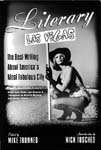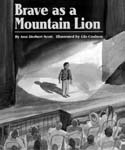Book Reviews
This Is Not "Our Town"
 "No, this is not a good town for
psychedelic drugs. Reality itself is too twisted,"
Hunter Thompson wrote in Fear and Loathing in Las Vegas.
Michael Ventura, a columnist for the L.A. Weekly observed,
"it isn't everyday that you're invited to a rehearsal
for the Apocalypse. And imagine sharing it with someone."
These guys have a clue about Las Vegas. Unfortunately,
probably half of the writers in Literary Las Vegas
(Henry Holt, $12.95) really don't. For the most part,
their stories are stale rehashes of mythic Vegas; at
worst, as with Marc Cooper's "Searching for Sin City
and Finding Disneyland in the Desert," the pieces are
illogical and mean-spirited diatribes filled with provably
false misinformation. Many of the writers play the
dispassionate observer and actually think they've figured
out Las Vegas. Heh.
"No, this is not a good town for
psychedelic drugs. Reality itself is too twisted,"
Hunter Thompson wrote in Fear and Loathing in Las Vegas.
Michael Ventura, a columnist for the L.A. Weekly observed,
"it isn't everyday that you're invited to a rehearsal
for the Apocalypse. And imagine sharing it with someone."
These guys have a clue about Las Vegas. Unfortunately,
probably half of the writers in Literary Las Vegas
(Henry Holt, $12.95) really don't. For the most part,
their stories are stale rehashes of mythic Vegas; at
worst, as with Marc Cooper's "Searching for Sin City
and Finding Disneyland in the Desert," the pieces are
illogical and mean-spirited diatribes filled with provably
false misinformation. Many of the writers play the
dispassionate observer and actually think they've figured
out Las Vegas. Heh.
As uneven as this anthology is, it is worth it for
the gems, both by famous guys like Thompson, and little-known
authors like Phyllis Barber, whose piece on growing
up in 50's Vegas is so good I went out and got a copy
of her book How I Got Cultured: A Nevada Memoir. And
the transcript of Faith Francher and William Drummond's
piece for National Public Radio, "Jim Crow for Black
Performers" is a fine addition to the hidden history
of this very strange place.
By Lenadams Dorris
The Don's Last Gasp
It's deja vu all over again. Twenty-eight years after
The Godfather, Mario Puzo's fat new book about a Mafia
family with a casino in Las Vegas, The Last Don (Random
House, $25.95) reveals no new news from the underworld.
There's the cunning Old World Papa, ready to retire
and usher his family from the brutal bad old businesses
of drugs and porn into brutal legitimate gangster activity,
like casinos, movies, stocks and bonds. He's surrounded
by a pack of offspring elbowing to succeed him. After
half a dozen gory murders, including the obligatory
massacre-of-a-whole-rival-family-in-one-fell-swoop,
good looks ultimately triumph over evil, the Bad Guys
in Hollywood are left to eat each other, and the Don
dies happy, his family ensconced in legitimate society.
If you piled them on top of each other, The Last Don's
cliches would reach the top of the Stratosphere. Puzo
makes all card dealers money launderers and all women
(waitresses, showgirls, whatever) prostitutes. It made
me glad he didn't acknowledge the existence of maids,
porters, slot-mechanics, or the other 200,000 workers
that keep Las Vegas casinos running smoothly.
Like Casino and Showgirls, Puzo focuses on the high-rollers,
mobsters, executives and good-looking broads with voracious
appetites for furs and jewels. One grows quickly bored
with the endless descriptions of luxury, wealth, power
and beauty. Lia Vazzi, a simple Sicilian soul, hits
the nail on the head in his description of the Xanadu
Casino's exclusive high-roller villas: "What nonsense.
So beautiful. To what purpose? Why does anyone have
to live like that? It is too much. It takes away your
strength. It arouses envy. It's not clever to insult
the poor like that. Why then would they not want to
kill you?"
The jacket says The Last Don is "Soon to be a major
motion picture." I say, "Wait for the video."
by Kit Miller
Can you spell Owyhee?
 The latest trend in children's books is to gather a
correct smattering of multiracial cherubs together
in a white-bread suburban story. Too often the faces
are diverse but the background is the same old Dick
and Jane. Native Americans rarely make an appearance
and when they do they are too often cast as characters
in some mythic past, not as living breathing members
of the modern world.
The latest trend in children's books is to gather a
correct smattering of multiracial cherubs together
in a white-bread suburban story. Too often the faces
are diverse but the background is the same old Dick
and Jane. Native Americans rarely make an appearance
and when they do they are too often cast as characters
in some mythic past, not as living breathing members
of the modern world.
Ann Herbert Scott's new book, Brave as a Mountain
Lion (Clarion Books, $14.95), takes us to the Owyhee
Indian Reservation in northern Nevada and into the
home of Spider, who is scared to death of an upcoming
spelling bee. Through the week he gains confidence
from his dad, grandmother, and brother, who advise
him to be brave as a lion, clever as a coyote, and
silent as a spider. Scott subtly shows the extended
family, the ranching lifestyle, and native traditions
that are the fabric of reservation life.
Glo Cloason's sublime illustrations settle us in the
warm living room, where you can almost smell the boot
leather and deer meat. Outside, the horses and dogs
huddle against a snowstorm. And in the school gym on
the night of the big event the whole community comes
to life.
With this book, Scott adds another rich layer to her
portraits of life in the Great Basin from a kid's point-of-view.
by Kit Miller
[ Great Basin News Homepage |
Contents |
Previous Article |
Next Article ]
Copyright © 1996, Great Basin News Service
Designed by
Sierra Wave Internet Arts.
 "No, this is not a good town for
psychedelic drugs. Reality itself is too twisted,"
Hunter Thompson wrote in Fear and Loathing in Las Vegas.
Michael Ventura, a columnist for the L.A. Weekly observed,
"it isn't everyday that you're invited to a rehearsal
for the Apocalypse. And imagine sharing it with someone."
These guys have a clue about Las Vegas. Unfortunately,
probably half of the writers in Literary Las Vegas
(Henry Holt, $12.95) really don't. For the most part,
their stories are stale rehashes of mythic Vegas; at
worst, as with Marc Cooper's "Searching for Sin City
and Finding Disneyland in the Desert," the pieces are
illogical and mean-spirited diatribes filled with provably
false misinformation. Many of the writers play the
dispassionate observer and actually think they've figured
out Las Vegas. Heh.
"No, this is not a good town for
psychedelic drugs. Reality itself is too twisted,"
Hunter Thompson wrote in Fear and Loathing in Las Vegas.
Michael Ventura, a columnist for the L.A. Weekly observed,
"it isn't everyday that you're invited to a rehearsal
for the Apocalypse. And imagine sharing it with someone."
These guys have a clue about Las Vegas. Unfortunately,
probably half of the writers in Literary Las Vegas
(Henry Holt, $12.95) really don't. For the most part,
their stories are stale rehashes of mythic Vegas; at
worst, as with Marc Cooper's "Searching for Sin City
and Finding Disneyland in the Desert," the pieces are
illogical and mean-spirited diatribes filled with provably
false misinformation. Many of the writers play the
dispassionate observer and actually think they've figured
out Las Vegas. Heh.
 The latest trend in children's books is to gather a
correct smattering of multiracial cherubs together
in a white-bread suburban story. Too often the faces
are diverse but the background is the same old Dick
and Jane. Native Americans rarely make an appearance
and when they do they are too often cast as characters
in some mythic past, not as living breathing members
of the modern world.
The latest trend in children's books is to gather a
correct smattering of multiracial cherubs together
in a white-bread suburban story. Too often the faces
are diverse but the background is the same old Dick
and Jane. Native Americans rarely make an appearance
and when they do they are too often cast as characters
in some mythic past, not as living breathing members
of the modern world.